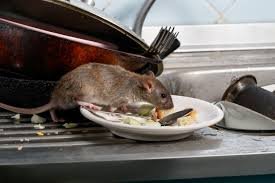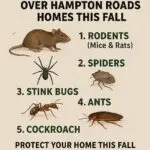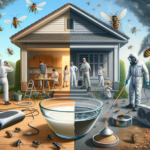
Rodents like mice and rats can become serious problems in homes, posing health risks, causing property damage, and contaminating food. One of the most common methods of controlling rodents is using rodenticides—chemical poisons specifically designed to kill these pests. While rodenticides can be effective, their use comes with significant risks to humans, pets, and the environment. In this blog post, we’ll explore safe rodenticide use, discuss alternative methods, and help you make informed decisions about managing rodent infestations.
What Are Rodenticides?
“what are rodenticides”
Rodenticides are chemical substances used to kill rodents. They come in various forms, including pellets, baits, powders, and liquids. These chemicals work by disrupting a rodent’s internal systems, often causing internal bleeding, neurological damage, or other fatal conditions.
There are two main types of rodenticides:
- Anticoagulants
“anticoagulant rodenticides”
These are the most common rodenticides. They work by preventing the rodent’s blood from clotting, leading to internal bleeding and death. Anticoagulants include ingredients like warfarin, brodifacoum, and bromadiolone. While effective, these chemicals can be harmful if ingested by non-target animals, including pets and humans. - Non-Anticoagulants
“non-anticoagulant rodenticides”
These rodenticides act in other ways, such as affecting the nervous system or causing organ failure. Some examples include zinc phosphide, bromethalin, and cholecalciferol. Like anticoagulants, they pose significant risks to non-target species if not used correctly.
The Risks of Using Rodenticides
“risks of rodenticide use”
While rodenticides are effective at eliminating rodents, they come with serious risks:
- Accidental Poisoning of Pets and Children
“rodenticide poisoning in pets and children”
Pets and children are particularly vulnerable to rodenticide poisoning. If they accidentally ingest poisoned bait, they may experience severe symptoms, including internal bleeding, seizures, or even death. It’s essential to place rodenticides in locations that are completely inaccessible to children and pets. - Secondary Poisoning of Wildlife
“secondary poisoning from rodenticides”
Rodenticides not only affect the rodents that consume them but also the animals that prey on them. Birds of prey, foxes, and other wildlife may be poisoned after eating a rodent that has ingested rodenticides, leading to a dangerous cycle of toxicity in the ecosystem. - Environmental Impact
“environmental impact of rodenticides”
Improper use of rodenticides can contaminate soil and water, posing long-term environmental hazards. The chemicals can persist in the environment and affect non-target species, disrupting local ecosystems. - Inhumane Deaths for Rodents
“inhumane rodent control”
Rodenticides can cause prolonged and painful deaths for rodents, which raises ethical concerns about their use. Humane alternatives are available for those who wish to control rodents without causing unnecessary suffering.
Safe Usage of Rodenticides
“safe rodenticide use tips”
If you choose to use rodenticides, it’s crucial to do so safely to minimize risks:
- Follow Label Instructions
“rodenticide label instructions”
Always follow the instructions provided on the product label. This ensures that the rodenticide is used in the correct amounts, placed in the right locations, and disposed of properly. - Use Tamper-Resistant Bait Stations
“tamper-resistant bait stations”
To prevent accidental poisoning of pets, children, and wildlife, always use tamper-resistant bait stations. These stations enclose the bait in a container that only allows rodents to access it, significantly reducing the risk of accidental ingestion. - Place Rodenticides in Inaccessible Areas
“safe placement of rodenticides”
Make sure to place rodenticides in areas where pets, children, and non-target animals cannot reach them. Ideal locations include attics, crawl spaces, and behind appliances, where rodents are likely to travel but are out of reach for others. - Monitor and Dispose of Dead Rodents Properly
“safe disposal of dead rodents”
After using rodenticides, monitor for dead rodents, and dispose of them safely. Use gloves and place dead rodents in sealed plastic bags before disposing of them in the trash. This reduces the risk of secondary poisoning to scavengers and predators.
Alternatives to Rodenticides
“alternatives to rodenticides”
If you’re concerned about the risks associated with rodenticides, there are several alternative methods for rodent control that are safer and more humane.
- Traps
“humane rodent traps”
Traps are one of the most effective and humane alternatives to rodenticides. There are various types of traps available:- Snap Traps: These traps kill rodents instantly by using a spring-loaded mechanism. When placed correctly, snap traps are effective and cause minimal suffering.
- Live Traps: Live traps allow you to catch rodents without harming them. After capturing the rodent, you can release it far from your home. However, it’s essential to relocate them to an area where they won’t cause harm to the local ecosystem.
- Exclusion Techniques
“rodent exclusion methods”
Preventing rodents from entering your home is one of the best ways to control infestations without using poisons. Seal gaps, cracks, and openings in your home’s foundation, walls, and roof to block entry points. Install door sweeps, and make sure windows and vents are properly screened. - Natural Rodent Deterrents
“natural rodent repellents”
Certain natural substances can act as rodent repellents. For example, rodents dislike the smell of peppermint oil, garlic, and ammonia. Spraying these substances around entry points or areas where rodents are active can help deter them from coming inside. - Professional Pest Control
“professional rodent control services”
If you’re struggling with a rodent problem, consider hiring a professional pest control service. Pest control experts can identify the extent of the infestation, recommend safe and effective treatments, and use non-toxic methods when necessary.
Conclusion: Making the Right Choice for Rodent Control
While rodenticides are an effective tool for controlling rodents, they come with serious risks to humans, pets, and wildlife. By using rodenticides safely or choosing alternative methods, you can effectively manage rodent infestations while protecting your family, pets, and the environment.
At Adibug, we specialize in safe and eco-friendly rodent control solutions that prioritize the well-being of your home and the environment. Whether you need expert advice on rodent exclusion techniques or professional pest control services, our team is here to help.
Website: Adibug.com
Phone number: 7578520085








1 comment
Jerry
Really informative post! I’ve always been concerned about using rodenticides around my pets and children, so it’s great to learn about safe usage and alternative options. The emphasis on proper placement and safer, eco-friendly alternatives like traps and exclusion methods is exactly what I needed to know. Thanks for shedding light on such an important topic while keeping safety a priority